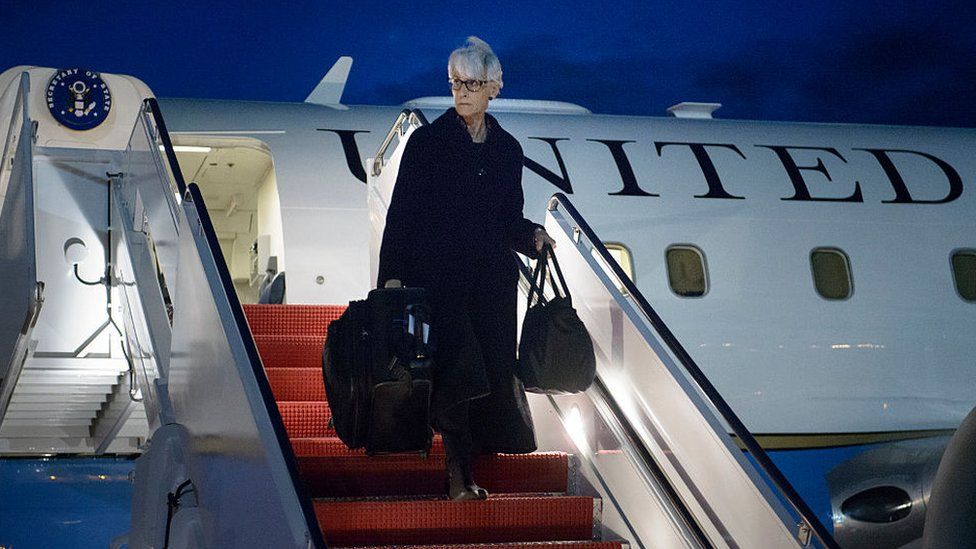Wendy Sherman, one of the world’s most powerful diplomats, is known as the Silver Fox because of her snowy white mane and her canny deal-making style. On Wednesday, she is helping to lead the US-Russia talks in Europe.
Ms Sherman – the US Deputy Secretary of State, one of the department’s top positions – has been meeting Russian officials this week to discuss Ukraine. The stakes are high.
President Vladimir Putin has deployed around 100,000 Russian troops close to the border with Ukraine, prompting fears of an incursion and warnings from the West.
US officials are hoping to defuse the tense situation through negotiations with the Russians – and Ms Sherman is in her element.
Known in Washington for her spiky manner, she has a history of tackling tough subjects head on.
Under President Bill Clinton, she tried to work out an agreement with the North Koreans that was designed to halt their efforts to build nuclear weapons.
In 2011, she took the lead on the US team’s nuclear talks with Iran, while President Barack Obama was in office. She eventually helped hammer out a historic nuclear accord between Iran and the P5+1 – the US, UK, France, China, Russia and Germany – in 2015.
(While the deal has since faltered, talks to save it and bring Iran back into compliance began in May, after US President Joe Biden took office).
At the time, Ms Sherman spoke about how being a woman was not a barrier to her progress in the negotiating room even though the Islamic Republic of Iran has strict rules about interactions between men and women.
“When I sat across from the Iranians I was the United States of America and perhaps as I woman I can say some things that don’t come across as tough, but when I do get tough and when I do lose it, it makes a big impression because it’s unexpected,” she said.
This video can not be played
To play this video you need to enable JavaScript in your browser.
Ms Sherman, 72, has pale skin and cropped, steely-grey hair, and despite the gruelling nature of negotiations she always looks put together – “never a hair out of place”, says a British diplomat who has worked with her during international negotiations.
She got her nickname from the Iranians, who began calling her “The Fox” because of her tricky approach to their talks. Her State Department colleagues embraced the moniker, and during the negotiations they wore T-shirts that read “Silver Fox”.
Her state department colleagues say that they watch with admiration, and sometimes a touch of fear, while she engages in the international discussions.
“She’s quick,” says James Jeffrey, a former US ambassador to Turkey who has observed Ms Sherman during her work as a diplomat. “And she’s very intense.”
She developed her diplomatic skills in an unusual manner: after studying at University of Maryland School of Social Work she helped children in Baltimore who needed foster care.
As a caseworker in the 1980s, she became frustrated with the effort to save abused children, so she became a community organiser in order to change the system. She was hired as director of a state office of child welfare and developed a reputation as a political operator.
A few years later, she joined the Clinton administration, going on to become the first female undersecretary of political affairs.
This week, she will put her skills to the test.
The negotiations with the Russians have been particularly gruelling, say analysts, and she will need all of the diplomatic tricks she can muster in order to achieve her goals – avoiding a major war in Europe.
She spoke with the Russian officials, a group that includes Sergei Ryabkov, a deputy foreign minister, in Geneva on Monday. She will talk to the Russians again on Wednesday at a meeting of Nato, the North Atlantic Treaty Organization, in Brussels, and in Vienna on Thursday.
The Russians have a list of demands: the US officials must agree that they will not expand Nato forces eastward. The Russians also want the US officials to rule out the possibility that Ukraine could someday join Nato.
So far, the negotiations between the US and Russian officials have reached an impasse. “We were firm,” she told reporters after their talks in Geneva, describing how she and the other US officials stood up the Russians.
The discussions in Europe have been challenging for both sides, the US officials and the Russians. Mr Ryabkov said that his conversations with Ms Sherman were useful – and bracing.
“The talks were difficult, long, very professional, deep, concrete, without attempts to gloss over some sharp edges.”






























